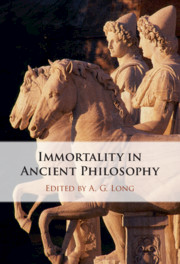Book contents
- Immortality in Ancient Philosophy
- Immortality in Ancient Philosophy
- Copyright page
- Contents
- Contributors
- Introduction
- Chapter 1 The Soul and the Celestial Afterlife in Greek Philosophy before Plato
- Chapter 2 Pythagorean Immortality of the Soul?
- Chapter 3 The Philosopher’s Reward: Contemplation and Immortality in Plato’s Dialogues
- Chapter 4 Pre-Existence, Life after Death, and Atemporal Beings in Plato’s Phaedo
- Chapter 5 The Immortal and the Imperishable in Aristotle, Early Stoicism, and Epicureanism
- Chapter 6 Socrates and the Symmetry Argument
- Chapter 7 Immortality in Philo of Alexandria
- Chapter 8 Plotinus on Immortality and the Problem of Personal Identity
- Chapter 9 Truth and Immortality in Augustine’s Soliloquies and De Immortalitate Animae
- Index of Passages
- Index of Names and Subjects
- References
Chapter 8 - Plotinus on Immortality and the Problem of Personal Identity
Published online by Cambridge University Press: 20 May 2021
- Immortality in Ancient Philosophy
- Immortality in Ancient Philosophy
- Copyright page
- Contents
- Contributors
- Introduction
- Chapter 1 The Soul and the Celestial Afterlife in Greek Philosophy before Plato
- Chapter 2 Pythagorean Immortality of the Soul?
- Chapter 3 The Philosopher’s Reward: Contemplation and Immortality in Plato’s Dialogues
- Chapter 4 Pre-Existence, Life after Death, and Atemporal Beings in Plato’s Phaedo
- Chapter 5 The Immortal and the Imperishable in Aristotle, Early Stoicism, and Epicureanism
- Chapter 6 Socrates and the Symmetry Argument
- Chapter 7 Immortality in Philo of Alexandria
- Chapter 8 Plotinus on Immortality and the Problem of Personal Identity
- Chapter 9 Truth and Immortality in Augustine’s Soliloquies and De Immortalitate Animae
- Index of Passages
- Index of Names and Subjects
- References
Summary
At first glance, Plotinus’ arguments for the immortality of the human soul, principally in Ennead IV 7 (2), constitute a straightforward defense of Plato against Peripatetic and Stoic attacks. And yet, his close reading of his predecessors, especially Aristotle and Alexander of Aphrodisias, led him to confront the following deep problem. The best arguments for immortality rest upon the immateriality of intellect and hence its immunity from destruction along with the body. But, following Aristotle, Plotinus maintains that the nature of intellection is such that the contents of the objects of intellection both identify the agent of intellection and further will be identical for every disembodied intellect. For this reason, it is not clear what it would mean to insist on the personal immortality of anyone. Without personal immortality, though, the ethical dimension of Platonism is, for Plotinus, severely undermined. In the light of this difficulty Plotinus developed an apparently original doctrine that was repudiated by virtually all his successors. He argued that there are Forms of individuals, that is, of individual intellects, and that, since they are eternal Forms, they are ‘undescended’. He argued that the personal identity of any human soul is found paradigmatically in an undescended intellect.
Keywords
- Type
- Chapter
- Information
- Immortality in Ancient Philosophy , pp. 178 - 195Publisher: Cambridge University PressPrint publication year: 2021

